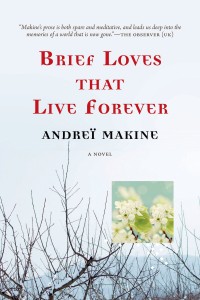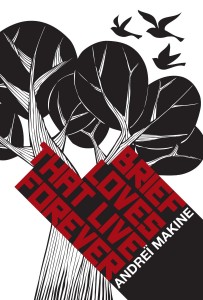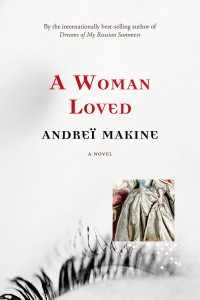And
 A Woman Loved by Andreï Makine
A Woman Loved by Andreï Makine
Translated by Geoffrey Strachan
Published by Graywolf Press, US, Maclehose Press, UK
Reviewed by Siân Miles
From the Stygian darkness of a State-run Soviet orphanage in the early and pre-Brezhnev years, the narrator of Brief Lives That Live Forever, a literally ground-breaking novel, tells a tale of smashed stones turning into nuggets of gold. The orphans are roughly fed and sheltered with the aim of their becoming manual labourers. Coarsened, boys and girls alike, by the expectation of a limited future, some of the children nevertheless retain a fathomless and inalienable understanding of, as well as a sensitivity to, the invisible yet omnipresent possibility of love. Matchless shit-detectors, some of them are equally sensitive geiger-counters in their capacity privately to seek it out, after which they cherish it quietly and, more importantly, without ceremony.
Every six months or so, in May and October respectively, parades are held to celebrate ‘Marxism-Leninism, an eternally living, creative, revolutionary doctrine’, the slogan in ten-foot high capital letters past which the children are regularly trooped. In a breathtakingly bold move, the boy narrator decides to penetrate the complex structure of the dismantled grandstand where the dignitaries and apparatchiks recently stood. In doing so, he gets hopelessly enmeshed and nearly  crushed to death.
crushed to death.
The powerful symbol of constraint and oppression is counterbalanced by the sight of a young war-widow who remains behind, mourning her submariner husband whose body is lost forever at sea. Her grief and the persistence of her love release the boy from his earlier feared imprisonment and death. Reflecting in maturity on this formative moment, the narrator widens the catchment area of his scorn and dismay: ‘Tomorrow this rotten regime falls apart. We find ourselves in a capitalist paradise and the people who step up onto the grandstand are millionaires, film stars, suntanned politicians…The crowd will parade past just the same. They don’t care who fills the grandstand. What matters is for it to be filled.’
Other women punctuate the story, providing flashes of to him dazzling insight and courage which fill the narrator with wonder. Through an important relationship formed between himself and a young girl, he learns of a mysterious female figure who once knew Lenin. Eventually it is discovered that the girl’s grandmother was indeed once Lenin’s secretary. The latter dictated to her a letter ordering the execution in reprisal of 100-1000 men. Shocked and disgusted by the casualness of the dash between the numbers, she stormed out in defiance and was consequently cast into ever more brutal gulags where she nevertheless maintained both her resistance and her dignity until finally released.
Later the growing orphan has a less meaningful affair with a girl he describes as boarding her morning bus ‘in a tornado of perfume. Even more than the bittersweet interrupted continuity of our brief separation, however, what intoxicates me is the floating lightness of it, the weightlessness of a misty May morning, the softly tinted transparency of the first, still, pale foliage.’ It is a purely physical relationship: ‘Instead of the solemn amatory monotheism of adolescence …we are relieved to discover the aimless, multiple idolatry of inconstancy.’
At the orphanage, the kids were in the habit of playing near landmines and other highly dangerous articles. One day, for fun (and Makine writes wonderfully about the sound of violence), they set fire to an unidentified object which is in fact an unexploded shell. In the colossal explosion and conflagration which ensues, one of them is so badly injured as to remain disfigured for the rest of his life. The narrator meets him at a much later date, during this last mentioned affair, when he is enviously spotted kissing goodbye his bus-bound girl. The two young men go picking morels together and on parting, one of them ‘is making a palpably superhuman muscular effort not to reveal his limping gait’ and offers a bunch of snowdrops, ‘maybe to give…someone … He gives me the flowers, walks away, and amid the fleeting and forgetful haste of my days, his gesture opens onto the start of a life that endures…’A gift from on high! I often say to myself, not knowing how better to express the simplicity with which this little cripple gave me perhaps the truest moment of love of all those I have ever known.’
The theme throughout is the folly of attempting to set in stone the glimpses granted of love, to turn it and the self into statues. From time to time, the narrator, now nearing the end of his days, his health broken by the cruelly oppressive regime, contrives to catch intermittent sight of a woman he loves, now married to a state dignitary. Knowledge of her continued existence alone satisfies his deep yearning. Sometimes, she too leaves the faint trace of a fragrance, reminiscent of both the gathered snowdrops and of the blossom in a hawthorn hedge grown iconic with age in Makine’s adopted France.
 Geoffrey Strachan’s near-faultless ear for English nuance catches the eternal ephemerality conveyed in Makine’s prose. Like all Strachan’s other work, it is a model of true faithfulness in which the translator effects the most elegant trompe l’oeil, disappearing totally behind the author’s words. Such empathy combined with self-effacement is the condition to which all translators aspire but rarely succeed in achieving.
Geoffrey Strachan’s near-faultless ear for English nuance catches the eternal ephemerality conveyed in Makine’s prose. Like all Strachan’s other work, it is a model of true faithfulness in which the translator effects the most elegant trompe l’oeil, disappearing totally behind the author’s words. Such empathy combined with self-effacement is the condition to which all translators aspire but rarely succeed in achieving.
A similarly superb translation job is made of Makine’s A Woman Loved, published a year later. Strachan includes just enough Russian vocabulary to convey its Muscovite setting and atmosphere. Many words are already familiar : dacha, apparatchik, samizdat, Politburo, gulag; to them is added shapka, the well-known fur Russian headgear, kolkoznik, a collective-farm worker and izba a traditional wooden house built of logs. And that’s it. He wisely avoids the practice of awkwardly exoticising for the sake of it and allows unaccustomed ways of thinking and acting, if indeed these exist, to be expressed by the thoughts and actions of Makine’s participating characters themselves.
Of the latter there are indeed many and varied, appearing and re-appearing over the several years it takes for the German-born narrator Erdmann, a film director, to record the development of a life-long project dear to his heart. This is a cinematic account of the life lived by Catherine the Great. Like Sartre’s Roquentin discovering the absurdity of attempting to write truthfully about a historical figure, Erdmann begins eventually and with painful longeur to learn what it is that he is really trying to achieve. In following, sometimes with difficulty, his social, emotional and professional adventures, the reader is given glimpses of the gradual dissolution of the Soviet Union and its replacement, in late post-perestroika, by an oligarchy no less unpleasant and deeply ruthless than its earlier Kremlin crocodiles.
In order to preserve every square millimetre of its valuable skin, the most economically efficient way of killing a crocodile, once captured and trussed-up, is for more than one man to wrest its jaws wide open (no mean feat) and prop between them a considerable length of sturdy stick. The crocodile eventually dies a slow death of starvation and dehydration, in an attitude which reveals its habitual modus operandi as well as the very many hideously sharp teeth with which it grinds down its once caught prey. Similarly, the earlier politically powerful Russian elite dies out, its jaws agape in this revelatory manner before being taken over by the greedy and rapacious leaders of the current government, propped up in turn by the thuggish instruments of the nouveau riche.
Once again, at the novel’s heart is a celebration of childhood and the simplicity of its capacity for love. However, this valuable theme is often so overlain with a rambling raft of plot and subplot that it becomes obscured and disfigured by imprecision and repetition. It could do with heavy editing to remove the plethora of redundant detail which threatens to stifle its message, descending in the last quarter of the novel into a sentimental conclusion. Comparisons are odious, as we know, but never in this reviewer’s experience have two novels by the same author appeared so quickly in such vivid contrast, with the earlier appearing structurally and by extension otherwise to offer far greater authority than its successor.
